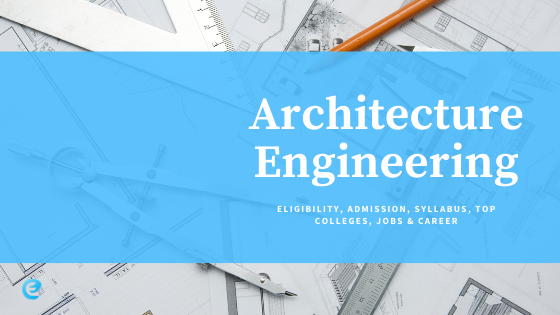What is Architecture Engineering?
Architectural Engineering, also known as building engineering, is a relatively new branch of the field. Architectural engineers mainly specialize in the planning, designing, construction, and designing of buildings. The engineers are at the forefront of designing buildings that are not only structurally sound and functional but are also ecologically-sustainable. Architectural Engineering has recently emerged as a result of rapidly advancing technologies.
The work of architectural engineers addresses significant problems of the 21st century like keeping the carbon footprint and Greenhouse gas emission to a minimum, and sustainable design structures fit to accommodate the fast-paced, growing technology. This type of career tends to appeal to people with strong science and math skills who have an interest in the building process. Different from architecture, which is an art of design, architectural engineering is the art and science of engineering and construction practiced concerning buildings.
Eligibility
- The students willing to apply for B.Tech Architectural Engineering must have an aggregate of 55% in class 10+2 with subjects Physics, Chemistry, and Mathematics.
- Students also need to appear and qualify National-level entrance exams (JEE/NATA) or University-level exams for admission in the course in respective universities.
- Diploma holders in architectural engineering after class 10th can also get direct admission in the second year of B.tech Architecture Engineering.
Personal Skills Required for the Course
A career in Architectural Engineering requires creative, imaginative, and analytical skills. The students should also have an eye for details and design, excellent communication, and problem-solving skills.
Admission Process
The admission process for B.tech Architectural Engineering includes National-level entrance tests and a counseling process for the allotment of seats in different colleges that offer the B.Tech Architectural Engineering program. Aspiring students can appear for either of the following exams to pursue the course.
JEE: Joint Entrance Exam (JEE) is usually conducted in April and May. It takes place in two parts: Mains and Advanced. JEE Mains is held in April, and the students who qualify Mains can then give the advanced paper in May. During the counseling, seats are allotted in different colleges based on the ranks.
NATA: National Aptitude Test in Architecture (NATA) is a National-level exam conducted for students in architecture-related courses like B.Arch and B.Tech Architecture Engineering in colleges across the country.
Course Details
The course of B.Tech Architectural Engineering is a four-year-long course with eight semesters. To become an architectural engineer in India, students can appear for JEE Mains or National Aptitude Test in Architecture (NATA) which is followed by counseling at Central and State-levels for admission in different colleges in the country. The course fees in most colleges range between 4 to 10 lacs depending on the college.
Curriculum
The curriculum of Architectural Engineering mainly focuses on the application of engineering principles on construction, planning, and designing of the buildings and other commercial and housing structures. The curriculum emphasizes on layouts and aesthetics of the building. It also trains the students engineering disciplines such as mechanical, electrical, fire protection, and others. Students are also taught various fundamental concepts like the strength of materials, thermodynamics, fluid mechanics, electric circuits, and engineering economics. Students also learn about the history of architectural design.
Core Subjects And Syllabus
The course of B.tech architecture revolves around the knowledge of the following core subjects:
- Architectural Design
- Architectural Detailing
- Architectural Graphics
- Building Electrical/Mechanical Systems
- Computer-Aided Drafting
- Construction Materials and Methods
- Contracts and Specifications
- Elementary Structures
- Estimating
- Materials Testing
- Physics
- Pre-Calculus
- Statistics
- Strength of Materials
These core subjects are taught across the duration of four years along with a few other subjects. The semester wise distribution of subjects is as follows:
Semester 1:
- English
- Mathematics I
- Physics
- Chemistry
- Basic engineering I
- Personality Development
- Physics Laboratory
- Chemistry Laboratory
- Engineering Drawing
- Computer Literacy
Semester 2:
- Mathematics -2
- Material Science
- Biology for Engineers
- Principles of Environmental Science
- Basic Engineering – II
- Theory of Architecture
- Building construction
- Architecture Graphics
Semester 3:
- Climatology
- Surveying
- History of Architecture – I
- Structural Mechanics
- Building Construction II
- Basic Design and Model Making
- Survey Laboratory
Semester 4:
- Structural Analysis
- Water Supply, Sanitation and Fire Fighting
- History of Architecture II
- Timber and Steel Structures
- Building Construction III
- Computer Studio I
- Architecture Design Studio I
Semester 5:
- Masonry and Concrete Structures
- Mechanical & Electrical Services in Buildings
- Acoustics & Noise Control
- Soil Mechanics
- Building Construction –IV
- Computer Studio-II
- Architecture Design Studio – II
Semester 6:
- RCC Structures
- Construction Technology
- Earthquake Resistant Buildings
- Estimation & Specification
- Foundation Engineering
- Working Drawings
- Personality Development – VI
- Architecture Design Studio – III
Semester 7:
- Project Management
- Town Planning
- Economics & Sociology
- Housing
- Practical Training
- Architecture Design – IV
Semester 8:
- Professional Practice
- Thesis Project
Electives
- Interior Design
- Art Movements & Architecture
- Contemporary Architecture
- Vernacular Architecture
- The technology of Tall Buildings
- Advanced Structures
- Construction Management
- Real Estate Management
The course delivery methods involve theoretical and field methods. Students are given lectures and taken for market surveys and industrial visits to enhance practical knowledge. Seminars, workshops and internships are also part of the course structure. The course is designed to help students have a vivid imagination through different design exercises and implement the theoretical design ideas and engineering principles in real work by working on practical technicalities.
Top institutes for B.tech Architecture Engineering
In India, the top institutes for B.tech Architecture as per the 2019 NIRF rankings are as follows:
- Indian Institute Technology, IIT – Kharagpur
- IIT Roorkee- Indian Institute of Technology
- NIT Calicut – National Institute of Technology
- SPA Delhi – School of Planning and Architecture
- College of Engineering Trivandrum – COE Trivandrum
- SPA Bhopal – School of Planning and Architecture
- NIT Trichy – National Institute of Technology
- Jamia Millia Islamia – JMI
- SPA Vijayawada – School of Planning and Architecture
- Birla Institute of Technology, Mesra
- Andhra University, Visakhapatnam
- School of Architecture and Planning, Anna University
- AMU – Aligarh Muslim University
- MANIT – Maulana Azad National Institute of Technology
- BMS College of Architecture
Job Profiles
The students pursuing B.tech architecture can pursue their careers and work as the following after graduation:
- Drafters
- Consultant
- Sales Engineer
- Building Inspector
- Consulting Engineer
- Technical Architects
- Construction Estimator
- Professor or Researcher
- Construction Project Manager
Job Prospects
Architecture Engineering is one of the most upcoming sectors. In India, there is a huge demand and supply deficit for skilled architecture professionals. The jobs in this sector include:
- Safety Management
- Site Selection
- Field Research and Supervision
- Quality Control
- Environmental Planning
- Estimating and Costing
- Supervision of Construction Work
- Interior Decoration etc.
An architecture engineer plays a key role in the overall construction of the buildings and structures, right from the designing and planning of the buildings. For undergraduates, various government departments such as Indian Army, Town and Country Planning Organization, National Institute of Urban Affairs, Housing and Urban Development Corporation, National Building Construction Corporation Ltd. etc provide jobs at various levels.
Private sector jobs are also highly rewarding in firms like Jones Lang LaSalle, L&T, Jindals, IMAXE, etc. Private practices post registrations are equally recognized in residential townships.
After successful completion of Architectural Engineering students can also be employed in industrial ventures, consultancy and private architectural firms, teaching institutions, real-estate development firms etc.
Qualified architects also work as consultants or set up their own private practice. An architecture engineer must be registered with the Council of Architecture before starting his/her career as an architect. The Council of Architecture plays a phenomenal role in the smooth regulation of architectural education and practice throughout India. Along with the Indian Institute of Architects, the Council of Architecture also lays down the guidelines for working hours, work environment, fees, etc.
Salary
An architectural engineer in the initial stages, just after graduation can earn up to 4-5 lakhs per annum based on their skills. After gaining more experience the annual package can go up to 15 lakhs.
Top Recruiters
After graduation students can get placed in the following sectors of Architecture and design:
- Colleges and Universities
- Pharmaceutical Manufacturing Design Companies
- Control systems Engineering Companies
- Construction/Engineering Technology Companies
Some of the companies where Architecture Engineers get placed are as follows:
- Hafeez Contractor
- Architect Consultants
- VSA Space Design
- Edifice Architects
- Gensler
Higher Education (Courses After Graduation)
After graduation in B.tech in Architecture Engineering, students can go for M.tech architecture for further studies. They can also do a Ph.D. in architectural engineering as well. Students can also go for an MBA after graduation.
Frequently Asked Questions (FAQs) About Architecture Engineering
Ques. Is architectural engineering and architecture the same?
Ans. Architectural Engineering prepares you to be a professional engineer with a specialization in construction, designing, and planning of buildings. Architects, on the other hand, are primarily responsible for the overall design of buildings according to the client’s needs. They hire engineers to help them work on the technical components like structure, air conditioning, plumbing, and electrical aspects of the building.
Ques. Is it hard to find a job as an architectural engineer?
Ans. Architectural engineering graduates typically get placed within 3-4 months of graduation. Some even get placed during their final year by on-campus placement drives. The only downside is that the starting packages are very low when compared with other professional careers with similar requirements.
Ques. What are the alternative courses to become an architecture engineer?
Ans. Apart from B.tech in architecture, students can also go for B.E. in architectural engineering. B.E. is also a 4-year long degree program. Interested students can apply for the course after 10+2.
Ques. Is it possible to become an architect after doing architectural engineering?
Ans. Yes, candidates who have completed their graduation in architectural engineering can pursue their career as an engineer. There are many courses after graduation which enable candidates to make the switch.



